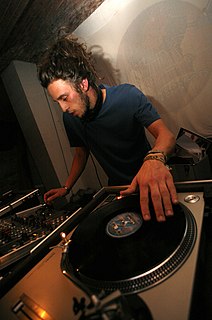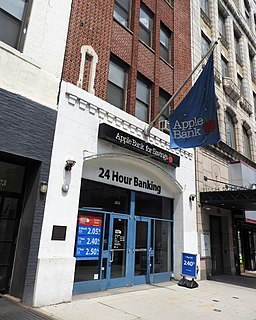
Disco is a genre of dance music and a subculture that emerged in the 1970s from the United States' urban nightlife scene.

A disc jockey, more commonly abbreviated as DJ, is a person who plays existing recorded music for a live audience. Most common types of DJs include radio DJ, club DJ who performs at a nightclub or music festival and turntablist who uses record players, usually turntables, to manipulate sounds on phonograph records. Originally, the disc in disc jockey referred to gramophone records, but now DJ is used as an all-encompassing term to describe someone who mixes recorded music from any source, including cassettes, CDs or digital audio files on a CDJ or laptop. The title 'DJ' is commonly used by DJs in front of their real names or adopted pseudonyms or stage names. In recent years it has become common for DJs to be featured as the credited artist on tracks they produced despite having a guest vocalist that performs the entire song: like for example Uptown Funk.
House music is a genre of electronic dance music. It was created mainly by disc jockeys and music producers from Chicago's underground club culture in the early and mid 1980s.

Chicago house refers to house music produced during the mid to late 1980s within Chicago. The term is generally used to refer to the first ever house music productions, which were by Chicago-based artists in the 1980s.

Larry Levan was an American DJ best known for his decade-long residency at the New York City night club Paradise Garage, which has been described as the prototype of the modern dance club. He developed a cult following who referred to his sets as "Saturday Mass". Influential post-disco DJ François Kevorkian credits Levan with introducing the dub aesthetic into dance music. Along with Kevorkian, Levan experimented with drum machines and synthesizers in his productions and live sets, ushering in an electronic, post-disco sound that presaged the ascendence of house music. He DJ'd at Club Zanzibar in the 1980s as well, home to the Jersey Sound brand of deep house or garage house.
Francis Grasso ) was an American soul music disc jockey from New York City, best known for inventing the technique of beatmatching which is the foundation of the modern club DJ's technique.
Balearic beat, also known as Balearic house, or simply Balearic initially is an eclectic blend of DJ-led dance music that emerged in the mid-1980s. It later became the name of a more specific style of electronic dance music that was popular into the mid-1990s. Balearic beat was named for its popularity among European nightclub and beach rave patrons on the Balearic island of Ibiza, a popular tourist destination. Some dance music compilations referred to it as "the sound of Ibiza," even though many other, more aggressive and upbeat forms of dance music could be heard on the island, such as Balearic trance.

A DJ mixer is a type of audio mixing console used by Disc jockeys (DJs) to control and manipulate multiple audio signals. Some DJs use the mixer to make seamless transitions from one song to another when they are playing records at a dance club. Hip hop DJs and turntablists use the DJ mixer to play record players like a musical instrument and create new sounds. DJs in the disco, house music, electronic dance music and other dance-oriented genres use the mixer to make smooth transitions between different sound recordings as they are playing. The sources are typically record turntables, compact cassettes, CDJs, or DJ software on a laptop. DJ mixers allow the DJ to use headphones to preview the next song before playing it to the audience. Most low- to mid-priced DJ mixers can only accommodate two turntables or CD players, but some mixers can accommodate up to four turntables or CD players. DJs and turntablists in hip hop music and nu metal use DJ mixers to create beats, loops and "scratching" sound effects.

Mobile disc jockeys are disc jockeys that tour with portable sound, lighting, and video systems. They play music for a targeted audience from a collection of pre-recorded music using vinyl records, cassettes, CDs, or digital music formats such as USB flash drives or laptop computers.

Heaven is a famous super club in Charing Cross, London, England. It has a long association with London's LGBT scene and is home to long-running gay night G-A-Y.
A DJ mix or DJ mixset is a sequence of musical tracks typically mixed together to appear as one continuous track. DJ mixes are usually performed using a DJ mixer and multiple sounds sources, such as turntables, CD players, digital audio players or computer sound cards, sometimes with the addition of samplers and effects units, although it is possible to create one using sound editing software.
DJ Harvey is a DJ born in London, England. He was an early exponent of the US disco/garage/house sound in the UK.
Nicky Siano is a former resident DJ at Studio 54.
Rick Squillante was a nightclub disc jockey and music industry representative and record producer, who rose to fame during the 1980s as the principal DJ at the Starck Club in Dallas, Texas. He has been noted as a major influence on many of today's modern DJs in the dance music trade.

James Michael Burgess was a disco record producer and New York DJ of the 1970s, and was variously referred to as "one of the hottest DJ's and Remixers of the Disco era"
Jack Beats is an English electronic-music duo from London, formed in 2007 by DJ Plus One and Beni G. They are also multiple DJ champions and award-winning DJs. The duo is known for wobbly basslines, big breakdowns and edgy a capellas which are cut, copied and pasted together.
David Padilla, is an American disc jockey of electronic dance music, house music, progressive house, and trance music. Padilla was the resident DJ at the Warsaw and The Mix.
The Crisco Disco was a New York City discotheque notable in the history of modern dance, LGBT and nightclub cultures.

DJing is the act of playing existing recorded music for a live audience.











